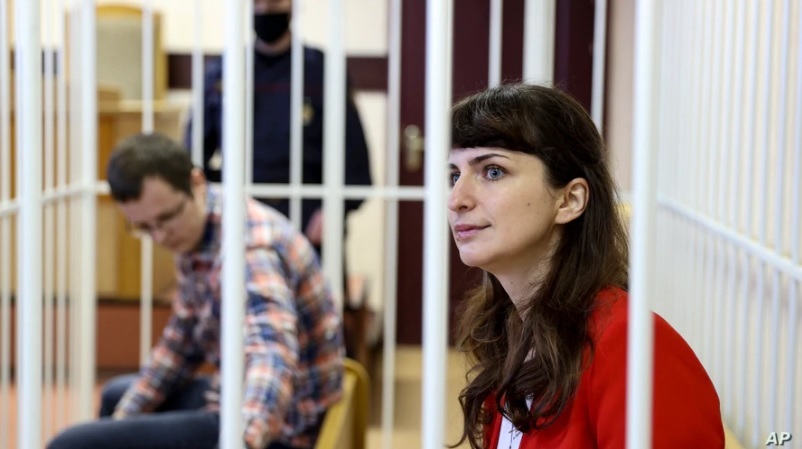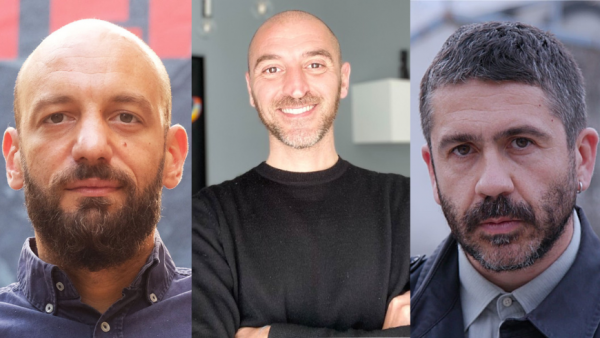The International Press Institute (IPI), a global network of editors, media executives and leading journalists for press freedom, today condemned the politically motivated jailing of yet another journalist in Belarus and called for her immediate release.
On March 2, a court in Minsk sentenced Katsiaryna Barysevich, a reporter at the independent online portal Tut.by, to six months in prison for revealing private medical information about a fatally injured protester which challenged an official account.
Citing hospital records, Barysevich had revealed that a protester who had died from severe injuries after a beating by suspected plainclothes police officers had not had alcohol in his system at the time – as a report by state authorities had claimed.
The journalist’s November 13 report posed major questions for the state agency Investigative Committee of Belarus (ICB) and indicated an attempt by authorities to muddy the waters over the protester’s death.
The protester, Raman Bandarenka, died on November 12 of brain and other injuries, sparking fresh public anger at the security forces and fuelling more protests in the following months against the regime of President Alexander Lukashenko.
Barysevich had been in custody since November 2020 and was convicted at the Moskovsky District Court in Minsk for “violating medical confidentiality with grave consequences”. She was also handed a fine equivalent to €910.
“The only ‘grave consequences’ that Barysevich’s reporting resulted in were for the security forces and state authorities themselves”, IPI Deputy Director Scott Griffen said. “The information revealed by Katsiaryna Barysevich’s reporting was strongly in the public interest. She has been jailed for doing her job: reporting the truth and holding authorities to account. Her conviction is yet another abysmal stain on Belarus’s press freedom record and another example of the government’s concerted effort to silence journalism which exposes or challenges the criminality of the state. She must be released immediately.”
Silencing critical reporting
Barysevich’s reported had cited medical documents that were obtained from the hospital where Bandarenka had been admitted. The report also quoted a doctor who was aware of the results of a preliminary diagnosis. Official medical documents clearly state Bandarenka had zero alcohol in his system at the time of death.
However, the official Investigative Committee, said: “The Minsk resident was examined by doctors, after which he was hospitalized in a health care institution, where during the initial examination, along with bodily injuries, he was diagnosed with alcohol intoxication.”
Tut.by cited an eyewitness account which suggested that Bondarenko, a 31-year-old artist, was beaten and hit on the head while he was lying on the ground by several men in a Minsk courtyard. The scuffle had reportedly broken out over white and red ribbons indicating indicating support for anti-government protests.
Media reporting suggested the men were plainclothes police officers attempting to break up protests. Bondarenko was then taken in a van to an emergency hospital and diagnosed with a cerebral edema. He underwent surgery hours later and but passed away from his injuries.
The government denied a role in his death. Six days after the article was published, the Prosecutor General’s Office opened a criminal case due to “disclosure of medical secrets” and “provision of false information” over Bandarenka’s death. Police searched the journalist’s apartment at the time.
Barysevich is one of several journalists jailed in Belarus for reporting on anti-government protests which broke out over the fraudulent presidential election victory of long-serving authoritarian leader Alexander Lukashenko.
“The authorities have unleashed unprecedented repressions against journalists, jailing some, scaring others and expelling them from the country”, Andrei Bastunets, chair of the Belarusian Association of Journalists, said in a statement.
On February 18, Belsat TV journalist Katsyaryna Andreyeva and camerawoman Darya Chultsova were sentenced to two years of imprisonment in a minimum-security penal colony for their reporting on the protests.
Since nationwide protests erupted on August 9, monitoring groups have documented more than 400 cases of journalists being arrested just for doing their job.
In December, IPI published a full-page ad in The Washington Post calling on the international community to defend press freedom in Belarus.



